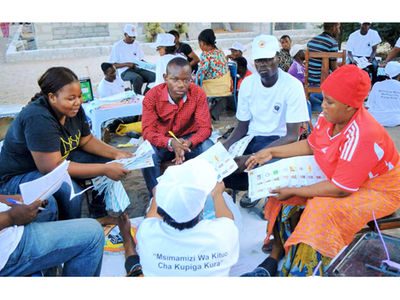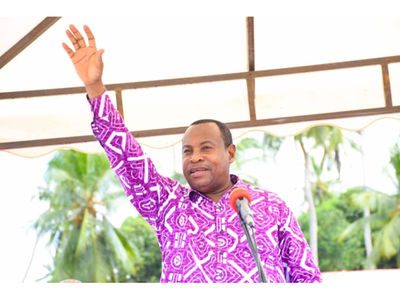Accra-based lawyer Esine Okudzeto, daughter of Lawyer Samuel Awuku Okudzeto alias “Sam Okudzeto”, has filed an affidavit before an Accra High Court seeking to be removed as a defendant in an ongoing legal dispute concerning the estate of the late Dr Daniel Narh Siaw, who died in or around 2023.
In her sworn affidavit dated October 9, 2025, Ms Okudzeto, Accra, described her inclusion in the suit as “wrong and unnecessary”, insisting that she, along with her father, a former President of the Ghana Bar Association, who is the 1st and their law firm, Sam Okudzeto & Associates, the 2nd Defendants, had been improperly joined to the case.
This is the case in which the 90-year-old Sam Okudzeto has been sued by one of his father’s sons for forging documents, including a Will, to take some prime properties belonging to his stepmother, although he had no beneficial interest.
The properties, scattered across the country, were allegedly grossly under-valued in some instances by Sam, his daughter, and their law firm. The lawsuit also mentions Edem Kojo Doe Okudzeto, another offspring of Sam, as having played some roles.
But, according to Esine, the Letters of Administration with Will Annexed, which form the basis of a legal challenge by her paternal uncle, Peter Kweku Okudzeto, over some properties in dispute, were obtained by the 4th and 5th Defendants, Eric Akwetey-Siaw Sappor and Charles Noble Doe Acolatse, who are the proper parties to be sued.
She argued that neither she nor her father, a former Council of State Member and also a member of the General Legal Council for several years, nor their law firm bears any legal responsibility concerning the said Letters of Administration.
“The 1st Defendant played no role whatsoever in the acquisition or procurement of the Letters of Administration with Will Annexed, which is the subject of the Plaintiff’s challenge, and therefore has no legal interest in being made a party to proceedings that challenge its validity,” Ms Okudzeto stated in her affidavit.
She further explained that the 2nd Defendant, a law firm, merely acted in a professional capacity, preparing and filing documents on behalf of its client, and therefore could not be deemed to have any legal or beneficial interest in the will or the estate of the deceased, as stated in her uncle’s lawsuit.
“That the 2nd Defendant is a law firm that only acted professionally on the instructions of its client in preparing and filing documents. And that a law firm does not acquire any legal or beneficial interest in the Will or the estate of a deceased person by reason of such professional work, and therefore cannot properly be made a party to proceedings of this nature”.
Ms Okudzeto, the third Defendant in the case, teaches ethics at the Ghana School of Law, having taken over from her father, who previously taught the same subject at the institution.
She stated that her involvement was limited to assisting with the process of obtaining the Letters of Administration in her capacity as a lawyer. While acknowledging that she is named as a beneficiary under the will, she stressed that her interest in the properties had not yet developed into a legal title, as no vesting assent has been executed in her favour.
“That 1st, the 3rd Defendant, only acted in my professional capacity as a lawyer in facilitating the process of obtaining the grant of the Letters of Administration with Will Annexed. And that, although I am also a named beneficiary under the Will, my interest in the estate has not yet arisen into a legal title since no vesting assent has been executed in my favour”, the affidavit said.
It argued that “Until a vesting assent is given, a beneficiary remains in an expectant state and cannot be sued in respect of the devised property,” she noted, adding that her inclusion in the lawsuit was therefore “misconceived, as my role was purely professional and my beneficial interest has not matured into a legal capacity that would justify my being made a party”.
Citing settled legal principles, Ms Okudzeto argued that in matters involving a deceased’s estate, only executors or administrators of the estate are the proper parties to sue or be sued.
She concluded that the continued joinder of the 1st, 2nd, and 3rd Defendants was “wholly unnecessary, vexatious, and an abuse of the process” of the court.
Ms Okudzeto is therefore praying the High Court to strike out the three defendants: her dad, their law firm and herself, from the suit, asserting that their presence is not necessary for the effective and complete determination of “any or all of the matters in dispute and ought to be struck out as a party”.
“That if there is any party with proper legal standing in respect of the Letters of Administration with Will Annexed granted in the Estate of Daniel Narh, which is being challenged in this suit, it is the 4th and 5th Defendants, who applied for and obtained the LA with Will Annexed as Administrators with Will annexed”, adding “in this case, the proper parties are the 4th and 5th Defendants, who are the persons to whom the Letters of Administration with Will Annexed were granted”.
However, Peter Okudzeto, a beneficiary of the estate of the late Baby Angelina Mamle Siaw Sappore and sister to the late Dr Daniel Narh Siaw, has rejected the attempt by Sam Okudzeto, his daughter, and their law firm to evade the lawsuit, especially the claim of forgery among other allegations levelled against them in the lawsuit.
Peter opposes the move, describing it as “not only wrongful and erroneous but also misconceived and devoid of merit”, and vows to “demonstrate that each of the Defendants personally participated in fraudulent acts and professional misconduct and therefore cannot be said to have been improperly joined to this Suit”.
Peter Okudzeto, one of three children of the late Baby Angelina Mamle Siaw Sappore, asserts that his actions against the 1st, 2nd, and 3rd Defendants concerning the Estate are not solely based on professional negligence or misconduct in their capacity as legal representatives.
“Rather, the claim rests upon acts of wilful tortious misconduct and mala fides, personally engineered and executed by each Applicant and collectively acting in concert with the 4th and 5th Defendants, thereby constituting a profound and deliberate breach of their solemn fiduciary duties owed directly to the beneficiaries of the Estate, resulting in the unlawful deprivation and dissipation of estate assets”.
Peter, also a lawyer by profession, insisted that the presence of his half-brother, his niece, and their law firm “is irreplaceable and necessary for this Suit is dual-pronged: first, the 1st Defendant’s unauthorized retention and custody of original title documents pertaining to key estate properties necessitate their joinder for the coercive recovery of these vital instruments; and second, their presence is essential to ensure the Court can fully investigate and attach personal liability arising from these concerted acts and achieve complete and effective restitution to the estate.”
He reiterated the roles undertaken by each Defendant, including acts of fraud, misrepresentation, and unlawful enrichment to the detriment of the Estate.
“…the 1st, 2nd and 3rd Defendants/Applicants actively participated in the drafting and fabrication of a forged testamentary instrument purporting to dispose of Estate properties. The irrefutable evidence of mala fides in this act is centred on a fundamental and unassailable chronological impossibility: the purported Will, explicitly dated and executed in 2018, fraudulently includes the NCR House, a material asset which was only discovered as belonging to the Estate in the later part of 2019”.
“This profound anomaly confirms that the Defendants either deliberately inserted an asset ex post facto or backdated the entire instrument–acts which constitute clear fraud and betrayal of their professional mandate. Their presence is therefore essential for the Court to fully investigate the genesis of this deception and determine the true validity of the purported Will now under challenge”.
He insisted that “the continued joinder of the 1st, 2nd, and 3rd Defendants is essential for the full and effectual determination of this Suit, as the claims against them constitute personal, wilful fraudulent misrepresentation rooted in an irreconcilable conflict of interest that fundamentally vitiates their roles as lawyers and managers of the Estate”.
“My pleadings show that the 1st Defendant, as the Head of Chambers and directing mind of the 2nd Defendant, was aware or constructively aware of a material forgery in the purported Will, specifically the inclusion of the NCR House property discovered subsequent to the Will’s execution, but wilfully turned a blind eye. This failure directly enabled the 3rd Defendant (1st Defendant’s biological daughter), who served as both the filing counsel and a direct beneficiary under the contested Will, to move the Application for the grant of Letters of Administration, thereby confirming a concerted effort to unlawfully manipulate the Estate for personal gain”.
“My pleadings, which point to the fact that there had been correspondence between the 1st, 2nd, and 3rd Defendants and the late Dr Daniel Narh Siaw, stating the actual value of the property known and called “JET HOUSE.”
“Notwithstanding this knowledge, the 1st, 2nd, and 3rd Defendants, acting in concert with the 4th and 5th Defendants, grossly undervalued the said property in a deliberate attempt to evade mandatory estate duty. This fraudulent misrepresentation consequently renders the 1st, 2nd, and 3rd Defendants indispensable parties to the Suit, as their presence is required to compel the disclosure of the true value of the Estate properties and to ensure the correct quantum of estate duty is paid thereon”.
“The veracity of the averments of misconduct made against the 1st, 2nd, and 3rd Defendants can only be fully illuminated during cross-examination at the trial, based on their own correspondence in respect of the Estate–facts which the 4th and 5th Defendants are not competent to provide. The necessity of the presence of the 1st, 2nd, and 3rd Defendants in this suit is further underscored by the fact that an affidavit seeking variation of the value of the NCR House was improperly deposed to by a non-valuer lawyer from the 2nd Defendant’s firm, one Edem Kojo Doe Okudzeto, Esq., who failed to state the basis of his valuation, indicating a clear pattern of professional evasion regarding proper asset valuation”.
Peter revealed that “email correspondence exchanged between Dr. Daniel Narh Siaw and Lawyer Isaac Ofosu Boateng in 2016 and 2019, in which the said Lawyer Isaac Ofosu Boateng of the 2nd Defendant’s law firm stated that the properties of the estate had not yet been vested in the beneficiaries as of 2018, clearly shows that he acted on the instructions of the 1st, 2nd, and 3rd Defendants”.
“This further establishes that the 1st, 2nd, and 3rd Defendants are necessary parties to this suit, as the 4th and 5th Defendants are not in a position to testify to the contents or context of the said emails. The same situation applies to other multiple email correspondence exchanged between the 1st, 2nd, and 3rd Defendants and the late Dr. Daniel Narh Siaw in respect of the estate, as these matters, among others, together with their irresistible factual and legal implications which will illuminate the path of this Honourable Court, are within the exclusive knowledge of the 1st, 2nd, and 3rd Defendants”.
“The 1st, 2nd, and 3rd Defendants’ acts and conduct transcend mere professional error, constituting a wilful and egregious breach of their solemn fiduciary duties owed to the Estate and its beneficiaries. Having undertaken the representation of the Estate, the 1st, 2nd, and 3rd Defendants knowingly and deliberately created an irreconcilable conflict of interest situation, leveraging their privileged knowledge, position, and influence as legal counsels to actively perpetrate fraud, thereby securing their unlawful personal enrichment to the detriment of the Estate”.
He mentioned the narrow jurisdiction of the Court to summarily strike out a party as conditioned by Order 4 Rule 5(2) of the High Court (Civil Procedure) Rules, 2004 (C.I. 47). This procedural mandate dictates that the Court is empowered to exercise this exceptional power only upon satisfaction of one of two prerequisites: where the party has been improperly joined, or where no substantive relief or claim is sought against that party.
Consequently, the onus rests heavily upon the Applicants to demonstrate that the material, personal claims for fraud, breach of fiduciary duty, and prospective injunctive relief against the 1st, 2nd, and 3rd Defendants do not exist-a burden that the comprehensive pleadings in the Statement of Claim (to which we shall refer extensively) can only be determined in a full-blown trial, not through a summary determination.
“I have made clear and specific claims against the 1st, 2nd, and 3rd Defendants personally, and their presence before the Court is necessary for the full and effectual determination of the matter. That I am advised by Counsel and verily believe same to be true that since the 1st, 2nd, and 3rd Defendants are the architects of the fraudulent purported Will, their evidence and presence are indispensable for the Court to determine the validity of the purported Will under challenge”.
“Defendants/Applicants were not merely professional representatives, but were substantively and personally involved in the entire process which culminated in the grant of the Letters of Administration with Will Annexed.
Their involvement, spanning from the drafting of the contested Will (containing the fraudulent inclusion of the NCR House) to the filing and conduct of the probate proceedings, directly establishes them as the creators and custodians of the primary fraudulent instrument at issue. As a direct consequence of this comprehensive involvement, particularly the 1st, 2nd, and 3rd Defendants’ personal knowledge regarding the valuation of the “JET HOUSE” property and the genesis of the forged clauses, the said Applicants possess unique knowledge of the material facts relating to fraud, conflict of interest, and unlawful enrichment. These facts render their presence as necessary parties under Order 4 Rule 5(2).
“The substantive Suit seeks to restrain the 1st, 2nd, and 3rd Defendants/Applicants from acting as lawyers for the Estate, and this can only be done when they are parties to the Suit”.
Defendants/ Applicants are not merely retrospective but constitute a procedural imperative necessitated by the prospective, coercive relief sought in the substantive action. The Statement of Claim includes a prayer for an injunction to permanently restrain the 1st, 2nd, and 3rd Defendants from continuing to act as lawyers for the Estate due to the particularized allegations of fraud and professional misconduct, and the irreconcilable, ongoing conflict of interest arising from their personal status as alleged wrongdoers and beneficiaries”.
“the contention that their professional role is concluded is therefore untenable, as the conflict is not temporary but inherent, vitiating all past advice and threatening the integrity of all future dealings concerning the recovery and distribution of Estate assets-a threat amplified by the 1st Defendant’s continued custody of the original Estate documents and the 3rd Defendant’s incipient beneficiary interest in the Estate as a result of the purported Will, the subject matter of the substantive Suit”.
“This specific, substantive relief -the permanent injunction – is a matter strictly within the exclusive equitable jurisdiction of this Honourable Court and cannot, in law or practice, be adjudicated by any professional disciplinary body, nor can it be competently granted against a non-party. To summarily strike the Applicants out would inevitably render the Plaintiff/Respondent’s prayer for injunctive relief wholly nugatory, compel the institution of separate proceedings, and thus actively promote the multiplicity of suits that the Rules of Court, specifically Order 4 Rule 5(2), are designed to prevent, thereby obstructing the administration of complete justice”.
“Defendants/Applicants’ Affidavit in Support of their motion constitutes a fundamental procedural irregularity, as the issues raised therein are strictly matters of substantive defence to the claims of fraud and fiduciary breach and do not address the legal prerequisites for striking out a party”.
“The Applicants are improperly attempting to use a summary application, intended solely for technical questions of misjoinder or non-joinder, to argue the merits of their defence and deny the Plaintiff the right to a full trial”.
In this regard, he insisted that the court should not permit the defendants’ affidavit to prematurely displace and violate settled judicial precedents. Defences to grave and complex allegations of fraud must be determined by a rigorous testing of evidence through cross-examination, not through a summary hearing. This Honourable Court must affirm this precedent to prevent the Applicants from evading judicial accountability and scrutiny”.
The affidavit, he maintained, “constitutes a gross abuse of the Court’s process, deliberately seeking to circumvent the mandated trial process. The entire substance of the issues raised therein is strictly a matter of substantive defence to the grave claims of fraud and fiduciary breach, which are wholly irrelevant to the legal prerequisites for striking out a party”, adding Court to dismiss the from the three defendants and proceed to trial for a full determination of the issues of fraud, misconduct, and unlawful enrichment raised against them.
The post 90-year-Sam Okudzeto, daughter, Law Firm flee forged Will & undervalued properties scandal appeared first on The Herald ghana.





